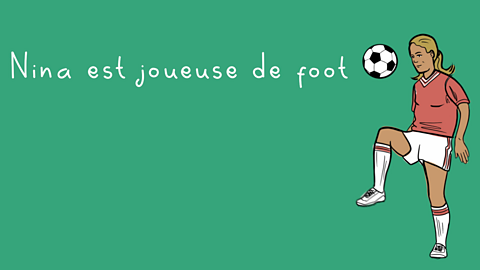How to use genders and articles in French
Every noun in French is either masculine or feminine.
The word you use for a or the depends on whether it’s with a masculine or feminine noun.
For a feminine noun une means a and la means the:
une banane, la banane.
For a masculine noun un means a and le means _the_:
un portable, le portable.
And if you have more than one thing then the le or la become les:
les pommes.
You do have to learn the genders of words. But there are some patterns which will help you.
la mère - mother and le père - father.
The gender of the word is the same as the gender of the person.
Nearly all words borrowed from English like le week-end and l’Internet are also masculine…
Words ending in -ment like l’appartement are masculine.
Words ending in -sion like la télévision are all feminine.
Words ending in -ure - like voiture are also feminine:
la voiture.
It is important to know if something is le or la masculine or feminine and with these tips you can make a start.
What is grammatical ‘gender’?
All French nouns have a grammatical gender - they are either masculine or feminine. It’s important to learn the gender of a word as you go along.
With masculine words, use le (the) or un (a/an) and with feminine words, use la (the) or une (a/an). With plural words, use les (the) or des (some). With all words that start with a vowel or ‘h’, use l’, regardless of whether it’s a masculine or feminine noun.
How do you know if a word is masculine or feminine?
With some words, it is easy to know whether they are masculine or feminine, because they describe male or female people.
- le père - father
- la mère - mother
All female family members are feminine and all male family members are masculine.
Definite articles - 'the'
The definite article is the word the. There are three words for the in French, depending on whether a word is masculine, feminine or plural.
| masculine | feminine | plural (masculine and feminine) |
|---|---|---|
| le | la | les |
Indefinite articles - 'a', 'an' and 'some'
The words for ‘a/an’ and ‘some’ change in French, depending on whether the noun is masculine or feminine.
| masculine | feminine | plural (masculine and feminine) |
|---|---|---|
| un | une | des |
How do you form plurals?
- Normally you add an '‘s’' to the end of the word.
E.g. le père turns into les pères (father - fathers)
(Use les (the) or des (some) with plural nouns)
But:
- If a word ends in -eau or -ou you normally add an ‘x’ to the end
E.g. le gâteau - les gâteaux (cake - cakes)
- If a word ends in -al, you normally take off the ‘l’ and add ‘ux’
E.g. un animal - des animaux (an animal - some animals)
Not all words follow these rules.
Some words are completely different in the singular and plural and others don't change at all (especially ones that end in -s, -z or -x).
Here are some examples:
l’œil - les yeux (eye - eyes)
le jus - les jus (juice - juices)
Quiz
Find out how much you know about genders and articles in French in this short quiz.
More on Grammar
Find out more by working through a topic
- count2 of 8

- count3 of 8

- count4 of 8

- count5 of 8

